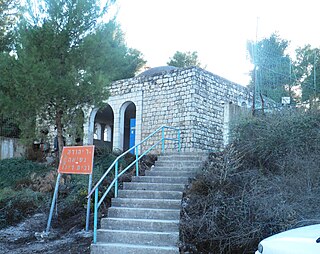Related Research Articles
Rabbi Abbahu was a Jew and Talmudist of the Talmudic Academies in Syria Palaestina from about 279-320 and is counted a member of the third generation of amoraim. He is sometimes cited as Rabbi Abbahu of Kisrin (Caesarea).

Judah ha-Nasi or Judah I, was a second-century rabbi and chief redactor and editor of the Mishnah. He lived from approximately 135 to 217 CE. He was a key leader of the Jewish community during the Roman occupation of Judea.
Johanan bar Nappaha was a leading rabbi in the early era of the Talmud. He belonged to the second generation of amoraim.

Judah II or Nesi'ah I was a famous Jewish sage who lived in Tiberias in the Land of Israel, in the middle of the third century CE.
Samuel of Nehardea or Samuel bar Abba, often simply called Samuel and occasionally Mar Samuel, was a Jewish Amora of the first generation; son of Abba bar Abba and head of the Yeshiva at Nehardea, Babylonia. He was a teacher of halakha, judge, physician, and astronomer. He was born about 165 CE at Nehardea, and died there in 254 CE. In the Talmud, Samuel is frequently associated with Abba Arikha ("Rav"), with whom he debated on many issues.
Shim‘on ben Lakish, better known by his nickname Reish Lakish, was an amora who lived in the Roman province of Syria Palaestina in the third century. He was reputedly born in Bosra, east of the Jordan River, around 200 CE, but lived most of his life in Sepphoris. Nothing is known of his ancestry except his father's name.
Dosetai is a Greek given name meaning "gift of God". It was extremely popular in late classical Judea and among Jewish communities in Egypt, and corresponds to the Hebrew "Mattaniah" or "Nethaneel," which seems to have been a favorite one both in Palestine and in Alexandria.
Bava Kamma is the first of a series of three Talmudic tractates in the order Nezikin ("Damages") that deal with civil matters such as damages and torts. The other two of these tractates are Bava Metzia and Bava Batra: originally all three formed a single tractate called Nezikin, each "Bava" meaning "part" or "subdivision." Bava Kamma discusses various forms of damage and the compensation owed for them.
Rabbi Zeira, known before his semicha as Rav Zeira and known in the Jerusalem Talmud as Rabbi Ze'era, was a Jewish Talmudist, of the third generation of amoraim, who lived in the Land of Israel.

Behar, BeHar, Be-har, or B'har is the 32nd weekly Torah portion in the annual Jewish cycle of Torah reading and the ninth in the Book of Leviticus. The parashah tells the laws of the Sabbatical year and limits on debt servitude. The parashah constitutes Leviticus 25:1–26:2. It is the shortest of the weekly Torah portions in the Book of Leviticus. It is made up of 2,817 Hebrew letters, 737 Hebrew words, 57 verses, and 99 lines in a Torah Scroll.
Jose ben Halafta or Yose ben Halafta was a tanna of the fourth generation. He is the fifth most frequently mentioned sage in the Mishnah. Of the many Rabbi Yose's in the Talmud, Yose Ben Halafta is the one who is simply referred to as Rabbi Yose.
Hanina bar Hama was a Jewish Talmudist, halakhist and aggadist frequently quoted in the Babylonian and the Jerusalem Talmud, and in the Midrashim.
Assi II was a Jewish Talmudist of the 3rd and 4th centuries who lived in the Land of Israel. He is known by the name of Yessa in the Jerusalem Talmud.
Eleazar ben Pedat was a Jewish Talmudist, known as an amora, in the Land of Israel, of the 2nd and 3rd generation.
Samuel ben Nahman or Samuel [bar] Nahmani was a rabbi of the Talmud, known as an amora, who lived in the Land of Israel from the beginning of the 3rd century until the beginning of the 4th century.
Ishmael ben Jose was a rabbi who lived at the beginning of the 3rd century. He was the son of Jose ben Halafta.
Rabbi Yannai was an amora who lived in the 3rd century, and of the first generation of the Amoraim of the Land of Israel.
Rabbi Yirmeyah was a prominent Jewish Amora sage of the Land of Israel, of the fourth generation of the Amora era.
Amemar was a Babylonian rabbi, of the fifth and sixth generation of amoraim.
Rabbi Isaac Nappaha, or Isaac the smith, was a rabbi of the 3rd-4th centuries who lived in the Galilee.
References
- ↑ Steinsaltz, Adin (1989). The Talmud . Random House. p. 114. ISBN 978-0-394-57666-4 . Retrieved 8 May 2012.
- ↑ Sifre, Deuteronomy 2; Genesis Rabbah 23, 76, 93
- ↑ Numbers 22:30
- ↑ Genesis 45:3
- ↑ Bava Metzia 10a; Yerushalmi Gittin 8 49c; Yerushalmi Bava Metzia 1 7d; Yerushalmi Bava Batra 8 16b
![]()